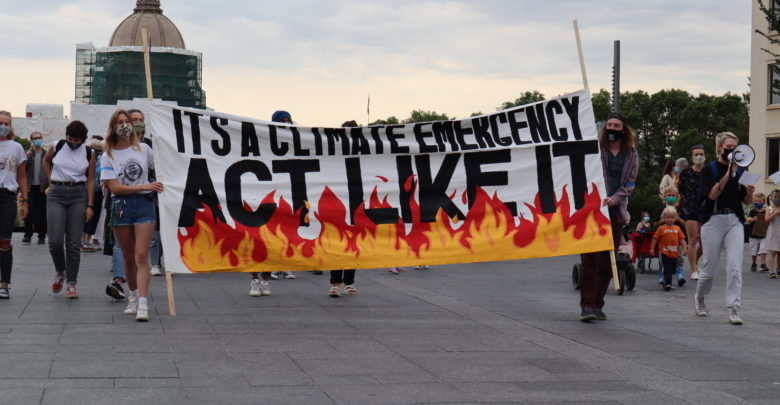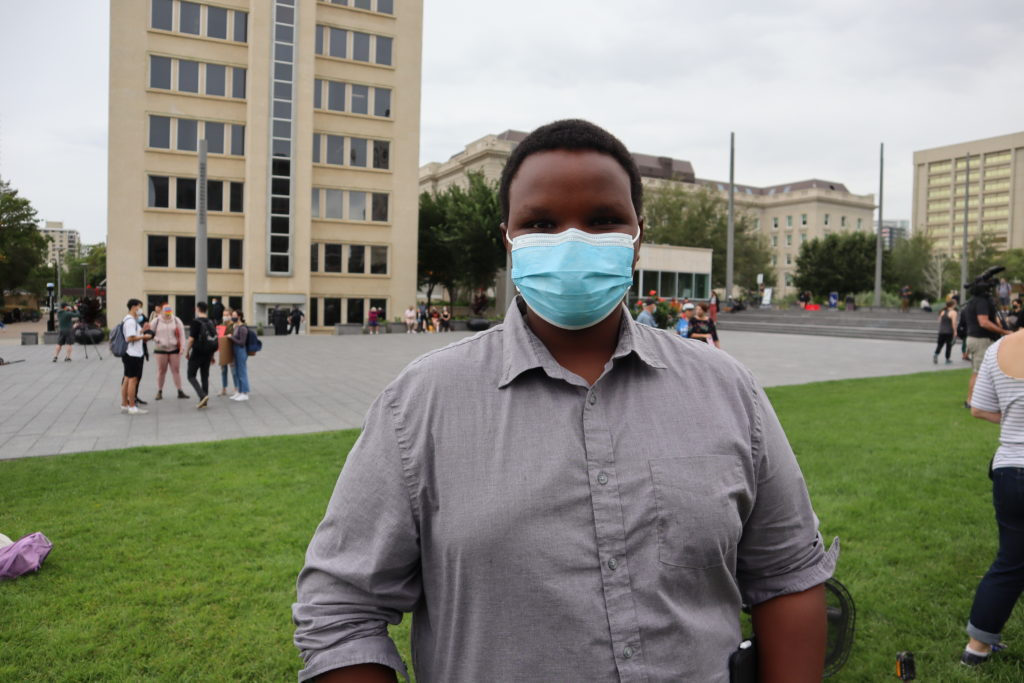Climate Justice Edmonton rallies for climate action
As the federal election draws near, climate action protesters are making their concerns and demands clear.
 Mitchell Pawluk
Mitchell PawlukDozens of protesters gathered at the Alberta Legislature on September 8 to highlight the severity of the climate change crisis and the expectations for politicians at all governance levels for climate action.
Climate Justice Edmonton organized the event, calling for urgent climate action with the phrase “‘Canada’ is on fire.” Basing the issue around the upcoming federal election, the organizers emphasized this election as one that should be focused around climate action and justice.
Speakers share prayers, voice frustration with lack of governmental action
The event was opened with a prayer from Kathy Hamelin, a nêhiyawak resident of Peace River. After reciting her prayer in Cree, Hamelin remarked that she and her Elder were concerned in the beginning of the year about the upcoming climate based on the winter’s snowfall, as “the snow had not even touched the base of the trees.”
After Hamelin’s prayer and addressing the climate concerns of her and fellow nêhiyawak people, Alexa from Edmonton Youth For Climate appealed to the youth in the audience. They expressed their frustration with the inaction from politicians and other people in power.
“I shouldn’t have to be here begging for accountability, but I am,” Alexa said. “It’s disrespectful to scientists who have dedicated their lives to climate research; it is disrespectful to the towns and Indigenous communities ravaged by forest fires, and it is disrespectful to me and the other young people who have watched climate change shrink our futures.”
The concluding speaker was Austin Mihkwâw, an organizer for the rally associated with Prairie Sage Protectors alongside being a youth councillor for Samson Cree Nation. In Mihkwâw’s closing remarks, he reaffirms the main focuses of the protest while giving a call to action to all individuals at the rally.
“A ballot box isn’t going to solve these problems,” Mihkwâw said. “A single voter, a single rally isn’t going to stop the interlocking systems of repression we are facing. No one’s coming to fix these issues, and no one’s going to solve them.
“So, then who do we have? We have each other; as individuals we have power and agency to make change, but more importantly, as a community [and] a collective, we have power and a voice.”
Rally prioritized transition to green energy, investment in health and education, and commitment to Indigenous communities
Sydney Thiessen, one of the organizers for the protest and affiliated with Climate Justice Edmonton, states that they want three main goals to be achieved by candidates for public office.
These goals include an immediate cessation of gas and fossil fuel expansion to transition workers into green energy, investment and expansion of health and education systems, and commitment to the recognition and respect of the rights and sovereignty of Indigenous peoples.
When considering the transition to green energy, Thiessen emphasized the multifaceted nature of the climate issue and the vulnerability of workers.
“We need to make sure that [candidates] put workers first and that no worker gets left behind as a result of this [green energy] transition,” they said. “We need to understand the intersectionality of climate change.”
Other targets for moving towards this transition included free transit, electric transit vehicles, and an encouragement for consumers to step away from diesel and gas fuelled vehicles. Additionally, Thiessen emphasized the connection between education and climate change, explaining that there’s an understanding that “lower amounts of education results in higher amounts of emissions.”
Expansion of the healthcare system was also a goal of the rally. Thiessen noted that climate effects like pollution and extreme weather events would increase, leading to an overburdening of the healthcare system. Nearly 500 people in British Columbia died due to a heat wave in June.
The rally highlighted Indigenous voices by demanding that climate justice is facilitated by Indigenous peoples. This includes supporting Indigenous healing, and the rebuilding of Indigenous culture.
“Indigenous people are stewards of the land. They understand what is the right balance [and] what is the right thing to do going forward,” Thiessen said.
Rally participants express individual climate crisis concern

Haruun Ali, an 18-year-old candidate for Edmonton’s City Council at Ward papastew, was amongst the attendees of the Climate Justice rally. He noted that his main concern was sustainability in the future.
“We need to build a city that works for people… [and is] environmentally sustainable for generations,” Ali said. “I want the city to work for me and my kids.”
Ali also highlighted how his campaign platform would support climate action.
“I think it’s important for the city of Edmonton to be a leader, so by 2035 we’d hit all of our targets,” Ali said. “We also need to make sure when we’re building housing [that] it’s both energy efficient and they’re built in a sustainable manner.”
“We also need to take action to protect our trees and our environment. That means building more parks. That means making sure we’re protecting trees when… development happens.”
For 62-year-old Edmonton resident Carmen Loiselle, the climate crisis is an underrepresented issue for candidates and politicians alike.
“I’d just like to see [politicians] talk about [climate action] more [and] make more promises,” Loiselle said “Be definite about it, and show that they are as scared as I am! I’m really scared! I only have about 30 more years left on this planet. It scares me what we’re leaving you.”
Talia Dixon was the rally’s emcee. Dixon is also vice-president (student life) of the University of Alberta Students’ Union (UASU) but did not attend the march in her capacity as an elected student official. Dixon, who spoke at the event, shared that one of her worries about the climate crisis was connected to her advocacy for women.
“I associate climate change and climate destruction… with violence against women [and] against all people,” Dixon said. “I think that’s part of my feminism, and that’s why it’s an intersecting thing for me. I’d also love to have kids one day; with the way climate change is going, that’s becoming less and less of a reality, which is absolutely unfair.”
Dixon and Thiessen both commented on the importance of climate action rallies and intersectional solutions in a province heavily reliant on gas and fossil fuels
“It is especially important that this is happening in Alberta,” Thiessen mentioned. “We are the largest oil and gas sector in Canada and we have a lot of oil and gas workers. We cannot afford to see these workers get left behind.”
Echoing Thiessen’s sentiments, Dixon emphasized the importance of raising awareness in Alberta and the climate crisis as a focal point in the upcoming elections.
“Having [direct action] here in Edmonton — the heart of oil country, in front of the place where Jason Kenney comes to work every day, is a very powerful thing because we’re able to say, ‘No, this matters, and we’re not going to be quiet, ever, about this issue,’” Dixon commented. “It is [important] for me and I think for many young people, [it’s] a top voting issue this year.”




